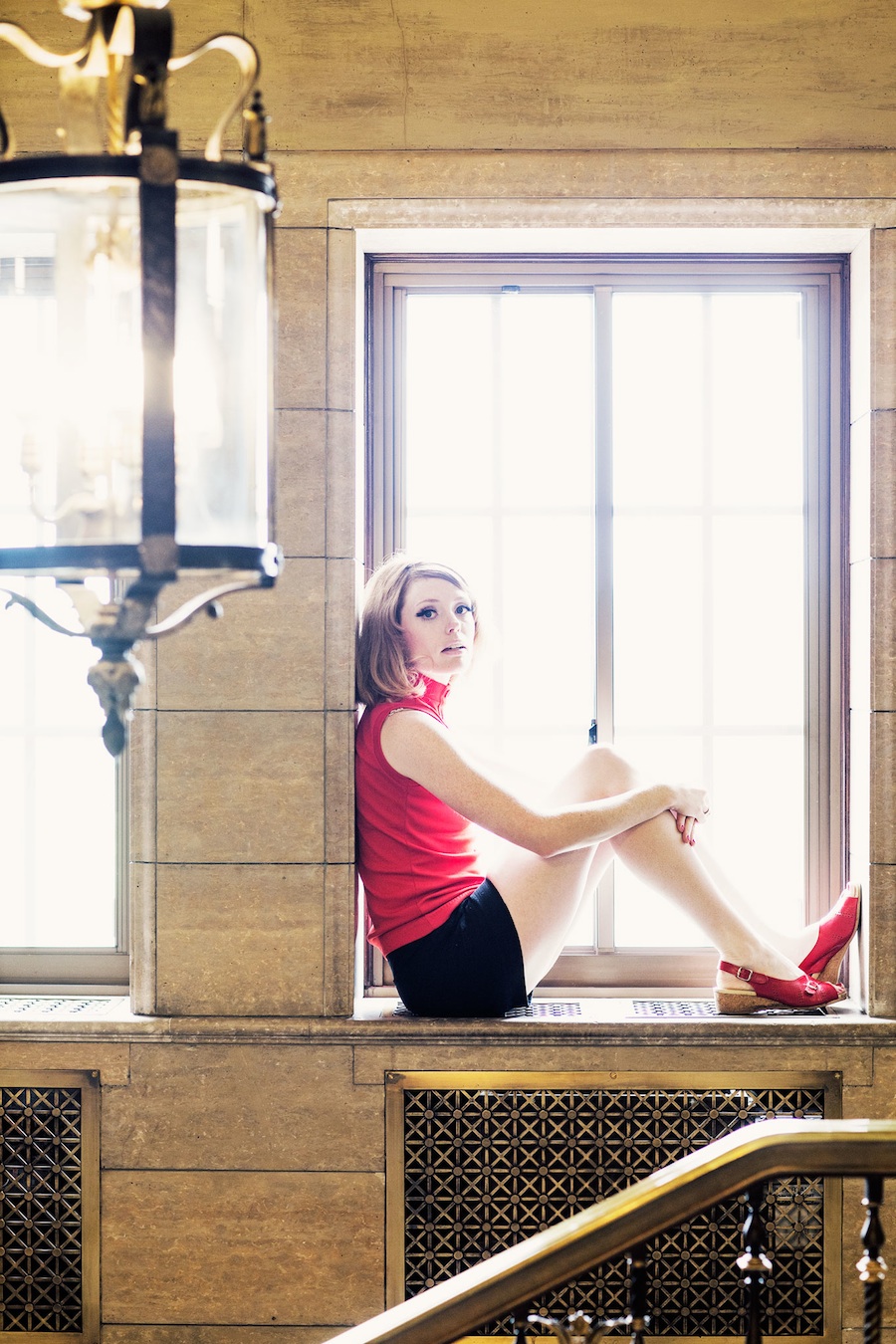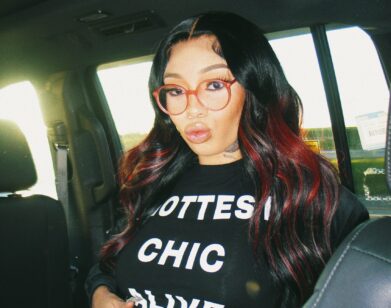Haley Bonar Builds

ABOVE: HALEY BONAR
Between her band Gramma’s Boyfriend and her career as a solo artist, Haley Bonar’s music takes many turns. In the past 10 years, she naturally progressed from stripped-down folk and country music to incorporating various layers of sound ranging from classical piano to sunshine pop. And within the past three years, her life drastically changed with the birth of her daughter, Clementine.
“I had this idea of who I was as an artist; and when I became a mother I gained a sense of confidence, power, and real fearlessness that I was lacking before,” Bonar said. “That just boosted everything like a boost pedal.”
After two and a half years of writing and recording, Bonar’s latest album The Last War debuts today, featuring a darker undertone than her previous records. On one standout track, “From a Cage,” Bonar’s lofty voice harmonizes with Justin Vernon’s. The two create a sound unheard on Bonar’s previous recordings as they work together to establish an aesthetic quality to an audible medium.
“The visual aspect of film is something that I try to work into my music,” Bonar continued. In regards to Last War, “It’s a really beautiful shade of pink-peach lipstick with really sharp teeth behind it,” she said before breaking out in laughter.
On the last of five consecutive rainy, dreary days in St. Paul, Minnesota, we spoke with Bonar over the phone about the album, her musical inclinations, as well as our mutual appreciation for the writings of Donna Tartt.
EMILY MCDERMOTT: You’ve been producing albums since 2001, but when did you first become interested in music?
HALEY BONAR: Music has always been a part of my life and because it always seemed so natural to me, it took someone else saying, “I think you should consider doing this for a job,” for me to actually look at it that way. To me, it wasn’t super goal-oriented in that way. It was like, “Oh, I like to play shows and I like to record,” but I didn’t think of it any more than that.
MCDERMOTT: Who was it that first said you should do this?
BONAR: Actually, my parents were the people that supported me when I faced the question of continuing college or going on tour. I was 19 years old and they were like, “You know, I think you should go take your books back and just do it because you can do it and not everyone can. So just go.” And I’m really glad that I listened, because that was pretty sound advice.
MCDERMOTT: Are your parents musical? Because it’s not too often that parents are like, “You know what, don’t go to college. Go pursue music.”
BONAR: [laughs] Drop out of college. Security is nothing. But no, my parents are not musical. They don’t play any instruments. We listened to music growing up, but they’re by no means music-heads or anything. They were just creative people and very supportive. I think they saw that in me.
MCDERMOTT: How do you think you’ve grown as an artist since you started producing albums?
BONAR: Everything was pretty stripped down, and that was definitely intentional and had to do with me being stubborn and not wanting to embellish the songs because I wasn’t performing them like that live. As I’ve gotten older and better at writing songs, and continue to play with different musicians and get more people involved in my recording projects, it’s naturally evolved into more production. I like having a lot of dynamics in a live performance, and so therefore I do that on the records, too. I think there’s always been hints at whatever is coming next. I don’t think there’s been a giant leap anywhere.
MCDERMOTT: You said you like to include other people and you’ve grown to do that. What led you to include Justin Vernon in this album?
BONAR: It was a happy accident. We have a lot of the same friends [and] live an hour and a half away, so we play with a lot of the same people. We had just never met. Basically he liked some of my pictures on Instagram, and I wrote him an email. We were corresponding that way, and I decided to write the song “From a Cage.” I shouldn’t say it was for Justin, but I definitely was writing it with him in mind. I wrote that song and sent him the demo 10 minutes after I finished recording it. He wrote me back the next day and said he listened to it 30 times in a row while he was plowing his driveway. We hung out a couple months later and went to his studio. I checked the place out and he basically offered his vocal services to me, like “if you want…”
MCDERMOTT: And how could you say no to that.
BONAR: I guess you can sing on my record. [laughs] He was supportive and helpful in the direction that song took.
MCDERMOTT: This album has taken a bit of a darker turn. What was the inspiration behind this album, and why the shift?
BONAR: Well, the shit hit the fan in my life. I went through this incredible period of and I was taken out of myself a little bit. I had a baby and had to redefine who I was. I’m a super sensitive person, and it was extremely difficult to navigate becoming somebody else’s everything and being a caretaker and then trying to take care of myself creatively and finding the time to do that. The writing process was an exorcism of all of those things. I think that it’s fair to say my previous records have a lot of darkness to them too. I think that on this one, the difference is that sonically it’s darker because there’s more distortion and it’s got a little bit more tease to it.
MCDERMOTT: You can hear that. If you’re facing a writing block, where do you look for inspiration?
BONAR: When I need inspiration, I usually go into a creative “slump” and become a total sloth. I watch a lot of movies, read a lot, go see shows, and go for walks. I don’t really touch my instruments because it’s like I’m collecting data. I love film. I love reading. Those two mediums are often more inspiring than listening to an awesome record. Seeing what somebody else is doing in another field, it’s like, “Wow! That’s amazing! I want to be amazing at what I’m doing!”
MCDERMOTT: Do you have a film or director or book that you find yourself returning to?
BONAR: I think the best book that I have read is The Secret History by Donna Tartt.
MCDERMOTT: That’s my favorite book in the entire world. I’m not kidding.
BONAR: Oh my god. [laughs] That book is… I can’t even explain how many times I’ve had this conversation with people who haven’t read it, like “You can’t even know! This is the best fucking book I’ve ever read.” It’s so powerful.
MCDERMOTT: You become so involved in the entire world and experience.
BONAR: Yes. You’re completely and utterly transported every time you pick that book up. It’s so hard to find a story like that. I’m actually reading The Goldfinch right now. I’m only 200 pages in, but she’s incredible. I love that she is so methodical about everything. She only has three books in her career and she’s just, she’s badass. The photo of her on the back of The Goldfinch is just like… [laughs]
MCDERMOTT: I don’t know if you saw, but they’re turning The Goldfinch into either a miniseries or movie.
BONAR: I always think if somebody makes a movie about The Secret History, who would do it? Who would direct that and do it right?
MCDERMOTT: It would be so difficult to bring that book to justice in a movie. I feel like that’s why it hasn’t happened yet.
BONAR: Yeah. It’s almost impossible. That one might just be untouchable.
MCDERMOTT: We’ll see what the future holds for her and her books… So I’ve read that people refer to your music as alternative country, but I don’t listen and think country at all. How would you define your music?
BONAR: I really try to confuse that. [laughs] It’s fair to say that some of my music, especially the earlier stuff, is a little bit more country, and I’m not ashamed of that. I love that kind of music. But I think people really, really need to put you in a category, [so] I try to kick that as much as I can. If somebody was like, “What’s Haley Bonar’s music like?” I would say, “Kind of all over the map. She’s got some country songs. She’s got some pop songs. She’s got some instrumental, classical piano stuff.” Maybe that all goes under the category of pop, but maybe it all goes under folk.
MCDERMOTT: How would you describe your philosophy toward music?
BONAR: I think my philosophy on music is sort of like the difference between religion and spirituality or religion and faith. There’s a lot of bullshit in the music industry. It’s really tough to get a leg up and navigate around your gender and stereotypes. You feel hopeless, [but] all of that disappears the minute that I start writing a song. Then I record something and have that magical feeling. You have to have the negative and the positive. Trying to own that and go to that place in yourself creatively is the most important thing. If you’re not doing it for that reason, then you’re in the fucking wrong business.
HALEY BONAR’S THE LAST WAR IS OUT NOW. FOR MORE ON THE ARTIST, PLEASE VISIT HER WEBSITE.






